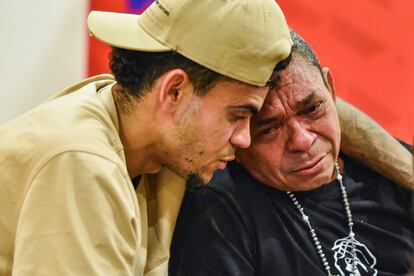Liverpool striker Luis Díaz and his father are reunited for the 1st time after kidnapping
The National Liberation Army, or ELN, acknowledged the kidnapping, saying it was a mistake and that its top leadership had ordered the father’s release

Liverpool soccer player Luis Díaz was reunited Tuesday with his father, who was kidnapped in northern Colombia by a unit of a guerrilla group in late October and released last week.
Photographs posted on the Colombian Football Federation’s account on X, formerly Twitter, captured the striker and his father, Luis Manuel Díaz Jiménez, hugging each other.
With the message “Welcome home Luchooo,” the federation announced the arrival of the elder Díaz to Barranquilla, where the Colombian national team is set to play against Brazil on Thursday.
Armed men on motorcycles kidnapped Díaz’s parents from a gas station in the small town of Barrancas on Oct. 28. His mother, Cilenis Marulanda, was rescued within hours by police who set up roadblocks around the town of 40,000 people, which is near Colombia’s border with Venezuela.
After the kidnapping, special forces were deployed to search for Díaz’s father in a mountain range that straddles Colombia and Venezuela. Police also offered a $48,000 reward for information that led to him.
It was initially unclear who carried out the abduction. Colombia’s government subsequently announced that it had information that a unit of the National Liberation Army, or ELN, was responsible. in the kidnapping,
The group later acknowledged the kidnapping, saying it was a mistake and that its top leadership had ordered the father’s release.
Diaz’s parents were taken amid peace negotiations between Colombia’s government and the guerrilla group. Authorities arrested four suspects over the weekend.
Colombia’s Ombudsman’s Office estimates that between January 2022 and September 2023, armed groups carried out 160 kidnappings and 121 releases.
After Díaz’s father was released, the government’s peace talks delegation demanded in a statement that the ELN immediately free anyone it still “has in captivity” and end its practice of kidnappings.
“It is unsustainable to argue, from an ethical point of view, that trading with human beings is legal, even under the conditions of an armed conflict,” the statement said.
Sign up for our weekly newsletter to get more English-language news coverage from EL PAÍS USA Edition
Tu suscripción se está usando en otro dispositivo
¿Quieres añadir otro usuario a tu suscripción?
Si continúas leyendo en este dispositivo, no se podrá leer en el otro.
FlechaTu suscripción se está usando en otro dispositivo y solo puedes acceder a EL PAÍS desde un dispositivo a la vez.
Si quieres compartir tu cuenta, cambia tu suscripción a la modalidad Premium, así podrás añadir otro usuario. Cada uno accederá con su propia cuenta de email, lo que os permitirá personalizar vuestra experiencia en EL PAÍS.
¿Tienes una suscripción de empresa? Accede aquí para contratar más cuentas.
En el caso de no saber quién está usando tu cuenta, te recomendamos cambiar tu contraseña aquí.
Si decides continuar compartiendo tu cuenta, este mensaje se mostrará en tu dispositivo y en el de la otra persona que está usando tu cuenta de forma indefinida, afectando a tu experiencia de lectura. Puedes consultar aquí los términos y condiciones de la suscripción digital.








































